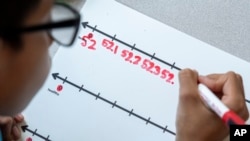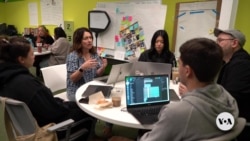Student Union
- By VOA News
Examining the facts behind US international student boom
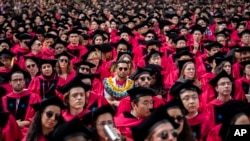
The U.S. international student population is booming.
The Chicago Tribune takes a look at the trend and what it means for colleges. Read the story here. (May 2024)
Howard University cuts ties with Sean 'Diddy' Combs after video of attack on ex-girlfriend
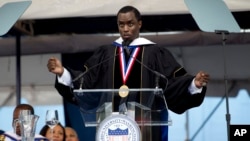
Howard University is cutting ties to Sean "Diddy" Combs, rescinding an honorary degree that was awarded to him and disbanding a scholarship program in his name, after a recently released 2016 video that appeared to show him attacking the R&B singer Cassie.
"Mr. Combs' behavior as captured in a recently released video is so fundamentally incompatible with Howard University's core values and beliefs that he is deemed no longer worthy to hold the institution's highest honor," a statement from the university's Board of Trustees said.
The statement said the board voted unanimously Friday to accept the return of the honorary degree Combs received in 2014. "This acceptance revokes all honors and privileges associated with the degree. Accordingly, the Board has directed that his name be removed from all documents listing honorary degree recipients of Howard University," it said.
The board also directed university administrators to cut financial ties to Combs, including returning a $1 million contribution, ending the scholarship program and dissolving a 2023 pledge agreement with the Sean Combs Foundation.
An email seeking comment was sent to a Combs spokesperson by The Associated Press on Saturday.
Combs admitted last month that he beat his ex-girlfriend Cassie in a hotel hallway in 2016 after CNN released video of the attack. In a video statement posted on social media, he said he was "truly sorry," and his actions were "inexcusable."
"I take full responsibility for my actions in that video. I was disgusted then when I did it. I'm disgusted now," Combs said.
A lawsuit filed last year by Cassie, whose legal name is Cassandra Ventura, set off a wave of similar cases and public allegations against Combs. That lawsuit was settled.
Billionaire gives graduates cash, but asks them to give, too

During a recent graduation ceremony at University of Massachusetts Dartmouth, a Boston billionaire gave each member of the graduating class $1,000.
As Jenna Russell reports in The New York Times, the gift came with a catch: The philanthropist asked the students to give half the money to any good cause. (May 2024)
America’s future diplomats forgoing foreign travel

U.S. students who want federal jobs as diplomats are skipping opportunities to study abroad or develop foreign contacts, according to a column in Foreign Policy.
Elizabeth Braw explains that government workers need security clearances, and students don’t want to complicate the process. Ultimately, their lack of expertise could hurt the nation. (May 2024)
Most US students are recovering from pandemic setbacks, but millions lag
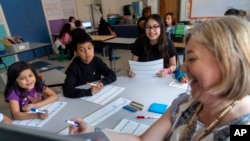
On one side of the classroom, students circled teacher Maria Fletcher and practiced vowel sounds. In another corner, children read together from a book. Scattered elsewhere, students sat at laptop computers and got reading help from online tutors.
For the third graders at Mount Vernon Community School in Virginia, it was an ordinary school day. But educators were racing to get students learning more, faster, and to overcome setbacks that have persisted since schools closed for the COVID-19 pandemic four years ago.
America's schools have started to make progress toward getting students back on track. But improvement has been slow and uneven across geography and economic status, with millions of students — often those from marginalized groups — making up little or no ground.
Nationally, students made up one-third of their pandemic losses in math during the past school year and one-quarter of the losses in reading, according to the Education Recovery Scorecard, an analysis of state and national test scores by researchers at Harvard and Stanford.
But in nine states, including Virginia, reading scores continued to fall during the 2022-23 school year after previous decreases during the pandemic.
Clouding the recovery is a looming financial crisis. States have used some money from the historic $190 billion in federal pandemic relief to help students catch up, but that money runs out later this year.
"The recovery is not finished, and it won't be finished without state action," said Thomas Kane, a Harvard economist behind the scorecard. "States need to start planning for what they're going to do when the federal money runs out in September. And I think few states have actually started that discussion."
Virginia lawmakers approved an extra $418 million last year to accelerate recovery. Massachusetts officials set aside $3.2 million to provide math tutoring for fourth and eighth grade students who are behind grade level, along with $8 million for literacy tutoring.
But among other states with lagging progress, few said they were changing their strategies or spending more to speed up improvement.
Virginia hired online tutoring companies and gave schools a "playbook" showing how to build effective tutoring programs. Lisa Coons, Virginia's superintendent of public instruction, said last year's state test scores were a wake-up call.
"We weren't recovering as fast as we needed," Coons said in an interview.
U.S. Education Secretary Miguel Cardona has called for states to continue funding extra academic help for students as the federal money expires.
"We just can't stop now," he said at a May 30 conference for education journalists. "The states need to recognize these interventions work. Funding public education does make a difference."
In Virginia, the Alexandria district received $2.3 million in additional state money to expand tutoring.
At Mount Vernon, where classes are taught in English and Spanish, students are divided into groups and rotate through stations customized to their skill level. Those who need the most help get online tutoring. In Fletcher's classroom, a handful of students wore headsets and worked with tutors through Ignite Learning, one of the companies hired by the state.
With tutors in high demand, the online option has been a big help, Mount Vernon principal Jennifer Hamilton said.
"That's something that we just could not provide here," she said.
Ana Marisela Ventura Moreno said her 9-year-old daughter, Sabrina, benefited significantly from extra reading help last year during second grade, but she's still catching up.
"She needs to get better. She's not at the level she should be," the mother said in Spanish. She noted the school did not offer the tutoring help this year, but she did not know why.
Alexandria education officials say students scoring below proficient or close to that cutoff receive high-intensity tutoring help and they have to prioritize students with the greatest needs. Alexandria trailed the state average on math and reading exams in 2023, but it's slowly improving.
More worrying to officials are the gaps: Among poorer students at Mount Vernon, just 24% scored proficient in math and 28% hit the mark in reading. That's far lower than the rates among wealthier students, and the divide is growing wider.
Failing to get students back on track could have serious consequences. The researchers at Harvard and Stanford found communities with higher test scores have higher incomes and lower rates of arrest and incarceration. If pandemic setbacks become permanent, it could follow students for life.
The Education Recovery Scorecard tracks about 30 states, all of which made at least some improvement in math from 2022 to 2023. The states whose reading scores fell in that span, in addition to Virginia, were Nevada, California, South Dakota, Wyoming, Indiana, Oklahoma, Connecticut and Washington.
Only a few states have rebounded to pre-pandemic testing levels. Alabama was the only state where math achievement increased past 2019 levels, while Illinois, Mississippi and Louisiana accomplished that in reading.
In Chicago Public Schools, the average reading score went up by the equivalent of 70% of a grade level from 2022 to 2023. Math gains were less dramatic, with students still behind almost half a grade level compared with 2019. Chicago officials credit the improvement to changes made possible with nearly $3 billion in federal relief.
The district trained hundreds of Chicago residents to work as tutors. Every school building got an interventionist, an educator who focuses on helping struggling students.
The district also used federal money for home visits and expanded arts education in an effort to reengage students.
"Academic recovery in isolation, just through 'drill and kill,' either tutoring or interventions, is not effective," said Bogdana Chkoumbova, the district's chief education officer. "Students need to feel engaged."
At Wells Preparatory Elementary on the city's South Side, just 3% of students met state reading standards in 2021. Last year, 30% hit the mark. Federal relief allowed the school to hire an interventionist for the first time, and teachers get paid to team up on recovery outside working hours.
In the classroom, the school put a sharper focus on collaboration. Along with academic setbacks, students came back from school closures with lower maturity levels, principal Vincent Izuegbu said. By building lessons around discussion, officials found students took more interest in learning.
"We do not let 10 minutes go by without a teacher giving students the opportunity to engage with the subject," Izuegbu said. "That's very, very important in terms of the growth that we've seen."
Olorunkemi Atoyebi was an A student before the pandemic, but after spending fifth grade learning at home, she fell behind. During remote learning, she was nervous about stopping class to ask questions. Before long, math lessons stopped making sense.
When she returned to school, she struggled with multiplication and terms such as "dividend" and "divisor" confused her.
While other students worked in groups, her math teacher took her aside for individual help. Atoyebi learned a rhyming song to help memorize multiplication tables. Over time, it began to click.
"They made me feel more confident in everything," said Atoyebi, now 14. "My grades started going up. My scores started going up. Everything has felt like I understand it better."
How to get students to ask for help
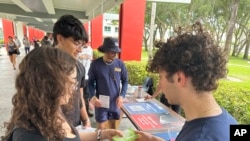
Colleges and universities have programs to help students adjust to the challenges of higher education but getting students to ask for help is a problem in itself.
In Inside Higher Ed, Cecilia Santiago-González and Zoe Lance offer tips for creating a culture where asking for help is part of the process. (May 2024)
- By Phil Mercer
Australian, Chinese university chiefs meet in Adelaide
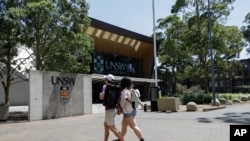
Australian university leaders held talks Wednesday with their Chinese counterparts over the Canberra government’s plans to cut the number of international students. Australia has said the reductions will ease the stress on housing and reduce immigration.
Representatives from the Group of Eight Universities, which represents large research-intensive institutions in Australia, met Wednesday in Adelaide with leaders from the China Education Association for International Exchange.
The Chinese delegation included senior officials from 22 leading research-intensive universities in China.
In a joint statement, the two groups said that “our research and education links not only deliver enormous economic and social benefits for both countries, but also foster enduring people-to-people ties.”
The talks focused on “constructive dialogue focused on challenges and opportunities around university research in a fast-evolving, globalized world.”
One major challenge is Australia’s plans to cap the number of international students it allows into the country to relieve pressure on housing and rental accommodation in the major cities. It is part of a broader effort to reduce immigration.
In 2023, official data showed that 787,000 international students studied in Australia, exceeding levels seen before the COVID-19 pandemic.
However, the tertiary sector says plans to shut out some foreign students would cost the economy billions of dollars.
Vicki Thompson is the chief executive of the Group of Eight Universities. She told the Australian Broadcasting Corp. Wednesday that it is unclear how far international student numbers would be cut.
“At the moment there is a lot of unknowns about what this will actually mean. We are in very good discussions with government, though. They certainly understand the impact that our international education sector has on tourism, on the economy. So, you know, they do not want to bust it either. It is just how can we come to, I guess, a compromise position where, you know, we do not damage one of our most successful export markets,” she said.
Most overseas students in Australia come from China, India, Nepal, the Philippines and Vietnam, according to government data.
Under the government’s plans, colleges and universities would have to provide purpose-built accommodation for international students if they wanted to exceed the caps on numbers.
Specific quotas for foreign students, however, have not yet been made public by the Canberra government.
Australia’s plan to curb the number of students from other countries is expected to be discussed when Chinese Premier Li Qiang meets Australian Prime Minister Anthony Albanese in Canberra next month.
Some shuttered universities appear to reopen on the web

At least nine universities that have closed appeared to be looking for new students on the web, but the schools are neither accredited nor cleared to accept student aid.
In a USA Today investigation, Chris Quintana looks at what might be going on with the imposter websites. (May 2024)
- By Akmal Dawi
Taliban push for normalizing male-only higher education
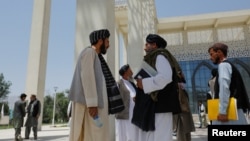
In coming weeks, tens of thousands of students in Afghanistan are set to sit for university entrance examinations.
Notably absent from the list of candidates will be females.
The upcoming exams are expected to determine the admission of about 70,000 students to public academic and professional institutions this year.
Last week, when officials from the Taliban's Ministry of Higher Education unveiled the specifics of the upcoming exams, they conspicuously omitted any mention of the exclusion of female students from university admissions.
Despite facing widespread domestic and international criticism for their prohibition of women from educational and professional opportunities, the Taliban have persisted in enforcing discriminatory gender policies.
“The exclusion of women from higher education significantly limits the country's economic potential, as half the population is unable to contribute effectively to the workforce,” David Roof, a professor of educational studies at Ball State University, wrote to VOA.
In December 2022, the Taliban suspended nearly 100,000 female students enrolled in both public and private universities across Afghanistan.
With the nation already grappling with some of the most dire female literacy rates globally, Afghanistan has failed to produce any female professionals over the past two years.
According to aid agencies, the absence of female medical professionals, compounded by other restrictions, has contributed to the deaths of thousands of young mothers in Afghanistan.
The United Nations reports that over 2.5 million Afghan school-age girls are deprived of education.
“The interruption in education can result in a generational setback, where entire cohorts of women remain uneducated and unqualified for professional roles,” Roof said.
'Hermit kingdom'
The elusive supreme leader of the Taliban, Hibatullah Akhundzada, purportedly responsible for the ban on women's education and employment, has never publicly clarified his directive.
Initially, when secondary schools were shuttered for girls in March 2022, Taliban officials said the action was "temporary," insisting that the Islamist leadership did not fundamentally oppose women's education.
However, more than two years later, Taliban officials have provided no rationale for the continued absence of girls from classrooms.
“They have normalized gender-apartheid,” said an Afghan women’s rights activist who did not want to be named in this article, fearing the Taliban’s persecution.
“This is a new norm in Afghanistan, however insane and destructive it may look in the rest of the world,” she added.
In January 2022, the U.S. Department of State appointed Rina Amiri as the special envoy for Afghan women, aiming to garner international backing for Afghan women's rights.
Amiri has actively engaged with Muslim leaders, emphasizing the importance of women's rights in Islam, in hopes of influencing Taliban leaders.
Despite these efforts, there has been no indication from Taliban leaders of any intention to abandon their discriminatory policies against women. “There is no indication this will subside,” Amiri told a Congressional hearing in January.
Senior U.S. officials have also warned the Taliban that there will be no normalization in their relations with the international community unless they allow women to return to work and education.
Thus far, the Taliban’s response has been that they value depriving women of basic human rights more than having normal relations with the rest of the world.
Hong Kong can help link students in US, China

Pandemics, climate change and other global challenges require nations and scientists to work together, and student exchanges are a great way to foster that cooperation.
Writing in The South China Morning Post, Brian Y.S. Wong explains that Hong Kong has a crucial role to play in connecting students in the United States and China. (May 2024)
Learn about religious accommodations in US colleges

From prayer services to housing options and vegetarian meal selections, colleges in the United States offer ways to accommodate students of various faiths.
In U.S. News & World Report,Anayat Durrani explains how you can learn about religious accommodations at colleges and universities. (April 2024)
- By Robin Guess
US community colleges create unique bachelor’s degrees
In the United States, community colleges traditionally give two-year associate’s degrees and certificates. That is changing as more of these colleges develop bachelor’s degree programs. The higher degree from these schools is making college more accessible and affordable nationally and internationally. Robin Guess reports. Camera: Roy Kim.
- By VOA News
Purdue U student from Nicaragua loves soccer and her studies
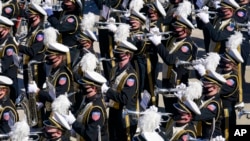
A student from Nicaragua blends academics and athletics to excel at Purdue University in the U.S. state of Indiana.
Andrea Martinez talks about her passion for soccer and her studies here. (April 2024)
- By VOA News
Writer offers packing tips for international students
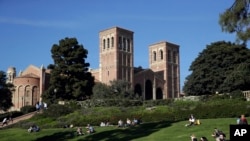
Deciding what to bring to college can be daunting.
A student from Singapore writes about her must-haves as an international student in the U.S.
Read it here. (April 2024)
- By VOA News
Siblings flourish at University of Cincinnati
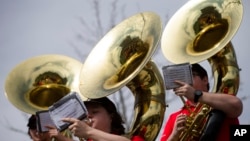
Two sets of siblings -- on from Kuwait and one from Saudi Arabia -- talk about their experiences as international students at the University of Cincinnati in the U.S. state of Ohio.
Read the story here. (April 2024)




